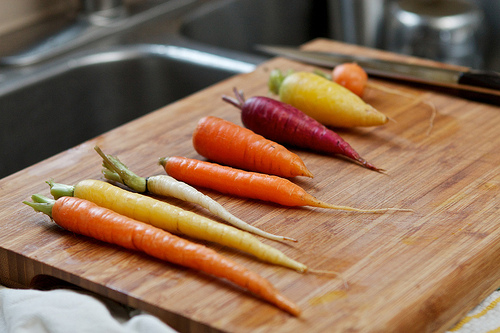Think Going Organic Will Break the Bank?
Reduced Food Costs from Purchasing Healthier Food and Eating Out Less Often
Copyright © Michelle Rebecca; all Rights Reserved; Posted November 18, 2012

 Of all the ideas about organic food, the one that deters the most consumers is the seemingly high cost of going organic. It’s easy to see why this exists; just look at the retail price on organic fruits, vegetables, and meats.
Of all the ideas about organic food, the one that deters the most consumers is the seemingly high cost of going organic. It’s easy to see why this exists; just look at the retail price on organic fruits, vegetables, and meats.
In fact, some studies show going organic can add as much as 20% to your food budget. The good news is that the trend is that organic prices are going lower due to increased demand (as long as you don’t shop at designer grocery stores).
Yet despite the conventional wisdom, organic food isn’t the budget buster you might think it is. You won’t see it right away as you browse the aisles, but if you look beyond the grocery bill you’ll see why organic food can actually be a better deal.
Misconceptions about Organic Food
According to the Mayo Clinic, the fact that organic farmers don’t use chemical sprays and fertilizers may lead to smaller and odd-shaped produce.
Don’t be put off by this. It is what is inside that counts. After all, you’re not buying art here; you’re buying the fuel that keeps your body working as efficiently as possible.
Another misconception is that this food may not, in fact, be any healthier than conventional food. Common sense indicates that it is. For example, produce that is treated with pesticides which are designed to kill pests simply can’t be good for humans either.
Just washing your food or cooking it as long as recommended might not be enough to alleviate the health risk. Sprayed pesticides that reach the ground are taken up by the root system and transferred into the produce.
More Home Cooking
Presumably, you’re buying organic because you want to eat healthier, more natural foods than your local restaurants and freezer aisles offer.
But in the long run, you’ll realize you don’t have to sacrifice savings for quality food and the health trade-off makes it more of a bargain in the long run.
When bloggers offer advice on how to save money, the first tip is to eat more at home. Dining in costs half as much as dining out, and prepared foods are pricier than the raw ingredients used to make them.
By buying organic, particularly unprepared foods like fruits and eggs, you’re more likely to cook healthy meals at home, which will replace all those fast-food meals and take-home pizzas and cut your food budget considerably over time.
Less Wasted Food
Maybe the food in your fridge or cabinet was selling at a low price, with coupons and special sales lowering it even more. Great deal, right? Not if you’re throwing half of it out.
If you end up tossing more food than you buy, you’re spending more money on food. One of the major contributors to this problem is that some people simply won’t consume left-overs.
Nearly one-third of all the food in the world goes uneaten, either because it goes bad or simply doesn’t get opened. On the other hand, organic food is less likely to be wasted, either because of the high retail price or the conscious effort taken to buy it.
You may pay more when you buy organic food, but because you end up eating more of it your money goes a lot further than it would with conventional groceries.
Get More for Your Money
As a useful analogy, people who work in heavy equipment transport know that volume is everything.
One shipment might cost more than another, but it could be a better value if the cost per pound is lower. Organic foods work the same way in that the savings may lie beneath the surface.
This is most obvious in organic meats. Cattle and chickens on organic farms are raised more humanely and sustainably than those raised on conventional farms.
They’re fed natural food with fewer antibiotics, and they’re more likely to live in free-range environments. This creates larger animals with more meat than fat, so there’s more meat to cook and enjoy. This translates to a lower cost per ounce than a conventional cut of meat.
If you’re thinking about going organic, don’t be scared off by the prices you see in the stores. Compare those costs with those of a conventional diet, and you’ll see the natural route is a better bet in the long run.
References:
About the Author:
Michelle is an aspiring writer with a passion for blogging. She enjoys writing about a vast variety of topics and loves that blogging gives her the opportunity to publicly voice her thoughts and share advice with an unlimited audience.
More Food and Gardening Articles
- Should You Steer Clear of Genetically Modified Food?
- Steak and Avocado Garlic Sauce Recipe
- Why Should You Grow a Personal Garden?
- Build a Raised Bed Vegetable Garden
Website © 2012 Kelly Smith; all rights reserved; content may not be copied, rewritten, or republished without written permission; Webmaster’s Google profile